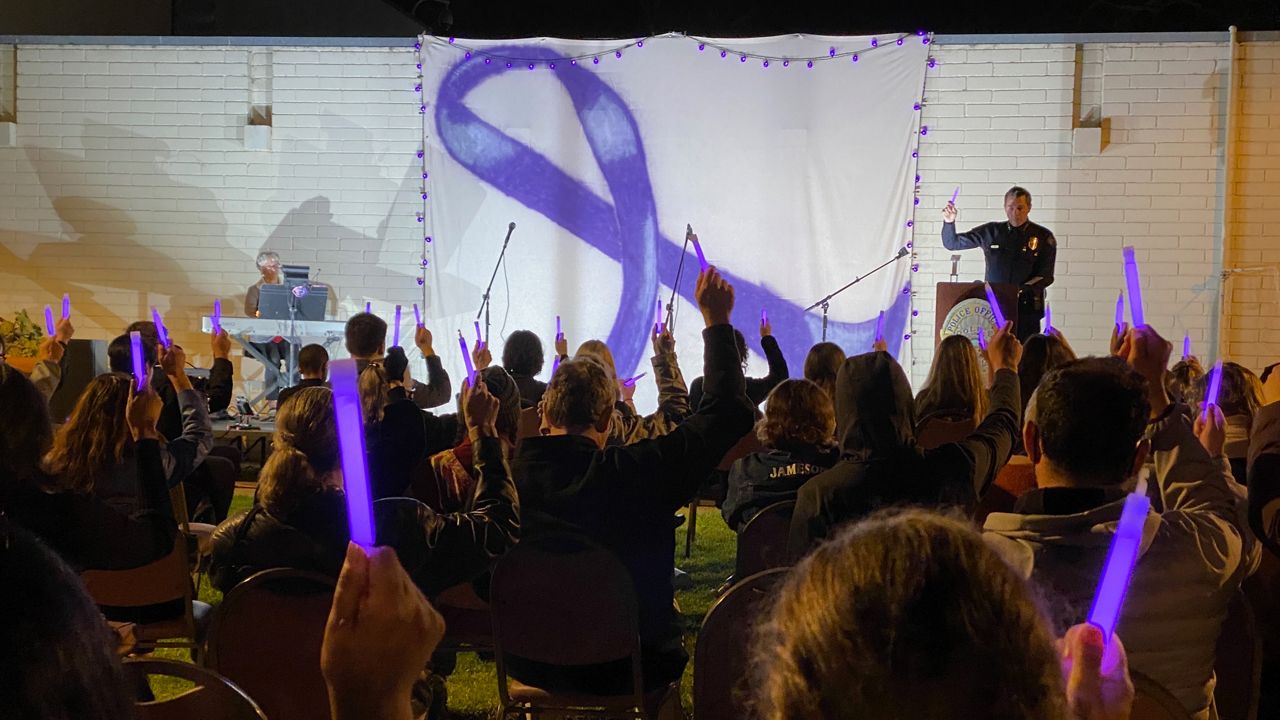REDONDO BEACH, Calif. — John Yates was leafing through one of his neighborhood newspapers one Thursday in 1998 when a short item caught his eye: The local police department’s domestic violence victim advocacy program was looking for volunteers.
He was surprised. In a previous life, well before he moved to Redondo Beach, Yates worked as a police officer. He knew well that many law enforcement agencies brushed intimate partner violence off as “domestic disputes,” and victims were left out to dry. When he saw that the Redondo Beach Police Department had cared enough about domestic violence to take action, he signed right up.
At the city’s annual domestic violence awareness vigil Saturday, Yates once again stood alongside his fellow volunteers in RBPD’s Domestic Violence Advocacy Program. The program trains and connects volunteers with people who have suffered domestic violence. Those victims of violence are given any assistance they might need from the moment that intimate partner violence is reported to police.
Advocates remain by a victim’s side throughout the legal process from the arrest of the abuser through the trial. They also connect victims and their family members with any resources they might need, including groceries, school supplies, clothes and career skills.
“On our path through life, we’re a product of our environment. Everything that’s happened to us, the things we’ve seen, smelled, experienced, our friends, our families — that’s why we are who we are,” Yates said.
RBPD’s Domestic Violence Advocacy Program was established in 1996. Then-City Prosecutor Michael Webb was searching for a project, and a paralegal on his team suggested that domestic violence victims are often left out in the cold in the push and pull between law enforcement and prosecution.
“If someone steals a car, you won’t have the victim come in and say, 'It’s my fault, I caused that, I don’t want prosecution,'” said Webb, who is now Redondo’s elected city attorney. “That’s more often the norm of domestic violence.”
When the program began, domestic violence was still a quiet societal norm. It was something that was still considered a private family matter to be easily swept under the rug. He recalled there was once a pre-printed form for victims to disavow the abuse they suffered and get charges against their abuser dropped. “Fill out their name and sign it, and no investigation would be done, and the case is over,” Webb said.
Police, he noted, are focused on the facts: determining the aggressor, the victim and the evidence. Prosecutors tend to be matter-of-fact with an eye toward justice but aren’t as emotionally attuned to caring for a victim.
Advocates bridge that gap, explaining each step of the way, staying present throughout the trial process and providing a sounding board for victims.
Ericka Sazo-Gonzalez has been working with the program since 2002, first as a volunteer then became the lead coordinator in 2007. During her time as the program’s lead, Gonzalez has ensured that domestic violence victims and survivors are well taken care of, especially throughout the pandemic. Supply drives over the last year and a half have become gift card drives. Throughout 2020, Redondo police officers made house calls, bringing goods directly to victims’ homes.
But other challenges were harder to overcome over the last year, especially during more stringent COVID restrictions.
“All of the services were either not open or were just via Zoom. For a victim that is at home with the abuser and kids, it is impossible for you to get on a Zoom call and being told you can’t attend support groups or counseling services,” Gonzalez said. More than that, domestic abuse-related calls fell throughout 2020. She estimates it was about half of the typical call volume.
But advocates hung in, knowing that intimate partner violence is difficult to break out of.
“Somebody will try to leave an abusive situation five to seven times before they are actually able to leave,” Gonzalez said.
For Irina, a domestic violence survivor who spoke via pre-recorded message Saturday night, part of her drive was to protect her children.
Her relationship with her abuser grew quickly. She became pregnant soon after they began dating, and though they moved in together, they never grew close. They were emotionally distant, he was financially distant and before long, he became violent. They separated a few times, and he came back, claiming he had changed.
In secret, she saved her money, rented a small apartment and slowly moved clothes over. Then, when the abuse reached a peak and police intervened, Irina took her sons to their new home, never looking back.
“Sometimes people disagree and say I should stay because of the kids. I thought I should leave because of the kids,” she said.
In recent years especially, domestic violence survivors have remained connected to the program. They could be seen the night of the vigil, assisting in their own ways or just reconnecting with their advocates in person. Though the night honors survivors and advocates (like Yates and RBPD Chief Keith Kauffman given "Visionary" honors), the vigil is a night of outreach.
For people in attendance and struggling to take next steps, resource partners like 1736 Family Crisis Center are on hand to offer assistance. And for those who aren’t Redondo locals, the advocates connect people in need to programs close to them.
“We network with a lot of people and a lot of organizations. It takes a village — really, an army — to help everyone,” Gonzalez said.
For more information about Redondo Beach’s Domestic Violence Advocacy program, call 310-379-2477, ext. 2336.
